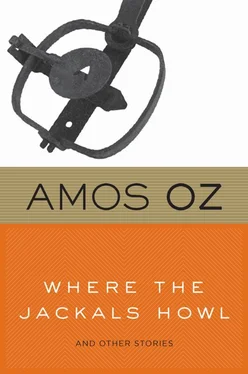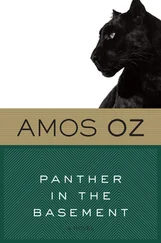Amos Oz - Where the Jackals Howl
Здесь есть возможность читать онлайн «Amos Oz - Where the Jackals Howl» весь текст электронной книги совершенно бесплатно (целиком полную версию без сокращений). В некоторых случаях можно слушать аудио, скачать через торрент в формате fb2 и присутствует краткое содержание. Год выпуска: 2012, Издательство: Houghton Mifflin Harcourt, Жанр: Современная проза, на английском языке. Описание произведения, (предисловие) а так же отзывы посетителей доступны на портале библиотеки ЛибКат.
- Название:Where the Jackals Howl
- Автор:
- Издательство:Houghton Mifflin Harcourt
- Жанр:
- Год:2012
- ISBN:нет данных
- Рейтинг книги:4 / 5. Голосов: 1
-
Избранное:Добавить в избранное
- Отзывы:
-
Ваша оценка:
- 80
- 1
- 2
- 3
- 4
- 5
Where the Jackals Howl: краткое содержание, описание и аннотация
Предлагаем к чтению аннотацию, описание, краткое содержание или предисловие (зависит от того, что написал сам автор книги «Where the Jackals Howl»). Если вы не нашли необходимую информацию о книге — напишите в комментариях, мы постараемся отыскать её.
Where the Jackals Howl — читать онлайн бесплатно полную книгу (весь текст) целиком
Ниже представлен текст книги, разбитый по страницам. Система сохранения места последней прочитанной страницы, позволяет с удобством читать онлайн бесплатно книгу «Where the Jackals Howl», без необходимости каждый раз заново искать на чём Вы остановились. Поставьте закладку, и сможете в любой момент перейти на страницу, на которой закончили чтение.
Интервал:
Закладка:
Felix saw to the dispatch of the van and proceeded to the nursery. From there he went on to the cowsheds and chicken coops. Then to the schoolhouse, where he gave instructions for lessons to be resumed not later than ten o’clock “without fail.”
Felix was animated by a passionate energy, which made his small, sturdy frame throb. He stowed his glasses away in his shirt pocket. His face took on a new look: a general, rather than a philosopher.
The farmyard was full of hens, unconcernedly scrabbling hither and thither, just like old-fashioned chickens in an old-fashioned village, as if oblivious that they had been born and bred in cages and batteries.
The livestock showed slight signs of shock: the cows kept raising their foolish heads to look for the roof, which had been carried off by the wind. Occasionally they uttered a long, unhappy groan, as if to warn of worse things still to come. The big telegraph pole had fallen on Batya Pinski’s house and broken some roof tiles. By five past eight, the electricians had already trampled all over her flower beds rigging up a temporary line. First priority in restoring the electricity supply was given to the nurseries, the incubators for the chicks, and the steam boilers so there would be hot meals. Felix asked to have a transistor radio brought to him, so that he could follow developments elsewhere. Perhaps someone should look in on Batya Pinski and one or two invalids and elderly people, to reassure them and find out how they had weathered the terrors of the night. But social obligations could wait a little longer, until the more essential emergency arrangements had been made. For instance, the kitchens reported a gas leak whose source could not be traced. Anyway, one could not simply drop in on people like Batya Pinski for a brief chat: they would start talking, they would have complaints, criticisms, reminiscences, and this morning was the least suitable time possible for such psychological indulgence.
The radio news informed us that this had been no typhoon or tornado, but merely a local phenomenon. Even the nearby settlements had hardly been touched. Two conflicting winds had met here on our hills, and the resulting turbulence had caused some local damage. Meanwhile the first volunteers began to appear, followed by a mixed multitude of spectators, reporters, and broadcasters. Felix delegated three boys and a fluent veteran teacher to stem the tide of interlopers at the main gate of the kibbutz, and on no account to let them in to get under our feet. Only those on official business were to be admitted. The fallen telegraph pole was already temporarily secured by steel cables. The power supply would soon be restored to the most essential buildings. Felix demonstrated the qualities of theorist and man of action combined. Of course, he did not do everything himself. Each of us played his part to the best of his ability. And we would keep working until everything was in order.
3
CONDENSATION ON the windows and the hiss of the kerosene stove.
Batya Pinski was catching flies. Her agility belied her years. If Abrasha had lived to grow old along with her, his mockery would surely have turned to astonishment and even to gentleness: over the years he would have learned to understand and appreciate her. But Abrasha had fallen many years before, in the Spanish Civil War, having volunteered to join the few and fight for the cause of justice. We could still remember the eulogy that Felix had composed in memory of his childhood friend and comrade; it was a sober, moving document, free from rhetorical hyperbole, burning with agony and conviction, full of love and vision. His widow squashed the flies she caught between her thumb and forefinger. But her mind was not on the job, and some of the flies continued to wriggle even after they were dropped into the enamel mug. The room was perfectly still. You could hear the flies being squashed between her fingers.
Abrasha Pinski’s old writings were the issue of the moment. Thanks to Felix’s energetic efforts, the kibbutz-movement publishing house had recognized the need to bring out a collected volume of the articles he had written in the thirties. These writings had not lost their freshness. On the contrary, the further we went from the values that had motivated us in those days, the more pressing became the need to combat oblivion. And there was also a certain nostalgia at this time for the atmosphere of the thirties, which promised a reasonable market for the book. Not to mention the vogue for memories of the Spanish Civil War. Felix would contribute an introduction. The volume would also contain nine letters written by Abrasha from the siege of Madrid to the committed socialist community in Palestine.
Batya Pinski sliced the dead flies at the bottom of the mug with a penknife. The blade scraped the enamel, producing a grating yellow sound.
At last the old woman removed the glass cover and poured the mess of crushed flies into the aquarium. The quick, colorful fish crowded to the front of the tank, their tails waving, their mouths opening and closing greedily. At the sight of their agile movements and magical colors, the widow’s face lit up, and her imagination ran riot.
Fascinating creatures, fish: they are both cold and alive. A striking paradox. This, surely, is the longed-for bliss: to be cold and alive.
Over the years Batya Pinski had developed an amazing ability. She was capable of counting the fish in her aquarium, up to forty or fifty, despite their perpetual motion. At times she could even guess in advance what course an individual fish or a shoal would take. Circles, spirals, zigzags, sudden totally capricious swerves, swoops, and plunges, fluid lines that drew delicate, complicated arabesques in the water of the tank.
The water in the tank was clear. Even clearer were the bodies of the fish. Transparency within transparency. The movement of fins was the slightest movement possible, hardly a movement at all. The quivering of the gills was unbelievably fine. There were black fish and striped fish, blood-red fish and fish purple like the plague, pale-green fish like stagnant water in fresh water. All of them free. None of them subject to the law of gravity. Theirs was a different law, which Batya did not know. Abrasha would have been able to discern it over the years, but he had chosen instead to lay down his life on a faraway battlefield.
4
THE ILLUSION of depth is produced by aquatic plants and scattered stones. The green silence of the underwater jungle. Fragments of rock on the bottom. Columns of coral up which plants twine. And on top of a hill of sand at the back of the tank is a stone with a hole.
Unlike the fish, the plants and stones in the aquarium are subject to the law of gravity. The fish continually swoop down on the stones and shrubs, now and then rubbing themselves against them or pecking at them. According to Batya Pinski, this is a display of malicious gloating.
As a procession of blood-red fish approaches the hollow stone, Batya Pinski rests her burning forehead against the cool glass. The passage of the live fish through the dead stone stirs a vague power deep inside her, and she trembles. That is when she has to fight back the tears. She feels for the letter in the pocket of her old dressing gown. The letter is crumpled and almost faded, but the words are still full of tenderness and compassion.
“I feel,” writes Abramek Bart, one of the directors of the kibbutz-movement publishing house, “that if we have been unfair to the beloved memory of Abrasha, we have been even more unfair to the minds of our children. The younger generation needs, and deserves, to discover the pearls of wisdom contained in the essays and letters of our dear Abrasha. I shall come and see you one of these days to rummage, in quotation marks of course, through your old papers. I am certain that you can be of great assistance to us in sorting through his literary remains and in preparing the work for publication. With fraternal good wishes, yours,” signed by some Ruth Bardor for Abramek Bart.
Читать дальшеИнтервал:
Закладка:
Похожие книги на «Where the Jackals Howl»
Представляем Вашему вниманию похожие книги на «Where the Jackals Howl» списком для выбора. Мы отобрали схожую по названию и смыслу литературу в надежде предоставить читателям больше вариантов отыскать новые, интересные, ещё непрочитанные произведения.
Обсуждение, отзывы о книге «Where the Jackals Howl» и просто собственные мнения читателей. Оставьте ваши комментарии, напишите, что Вы думаете о произведении, его смысле или главных героях. Укажите что конкретно понравилось, а что нет, и почему Вы так считаете.












